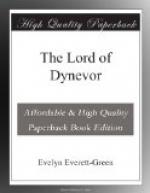Wendot’s cheek flushed, his eye kindled. He did indeed believe that were his father living he would be one of the first to hasten to his kinsman’s side. If indeed the united country could be strong enough to throw off the yoke, what a victory it would be! Was not every son of Wales bound to his country’s cause at such a time?
There was but one thing that made him hesitate. Was his word of honour in any wise pledged to Edward? He had paid him homage for his lands: did that act bind him to obedience at all costs?
But such refinements of honour were in advance of the thought of the time, incomprehensible to the wilder spirits by whom he was surrounded. Llewelyn answered the brief objection by a flood of rude eloquence, and Howel struck in with another argument not without its weight.
“Wendot, whatever course thou takest thou art damned in Edward’s eyes. Thou hast held thyself surety for us, and nought but death will hold us back from the cry of our country in her need. Envious eyes are cast already by the rapacious English upon these fair lands of thine, which these years of peace have given thee opportunity to enrich and beautify. Let the king once hear that we have rebelled, and his nobles will claim thy lands, thy life, thy liberty, and thou must either yield all in ignominious flight or take up arms to defend thyself and thine own. I trow that no son of Res Vychan will stand calmly by to see himself thus despoiled; and if thou must fight, fight now, forestall the foe, and come out sword in hand at thy country’s call, and let us fight shoulder to shoulder and hand to hand, as our forefathers have done before us. Thou knowest somewhat of English rule, now that thou hast lived beneath it these past years. Say, wilt thou still keep thy neck beneath the yoke, or wilt thou do battle like a warrior for liberty and independence? By our act thou art lost — yet not even that thought can hold us back — then why not stand or fall as a soldier, sword in hand, than be trapped like a rat in a hole in inglorious inaction? For methinks whatever else betided thou wouldst not raise thy hand against thy countrymen, even if thy feudal lord should demand it of thee.”
“Never!” cried Wendot fiercely, and his quick mind revolved the situation thus thrust upon him whilst Howel was yet speaking.
He saw at once that a course of neutrality would be impossible to him. Fight he must, either as Edward’s vassal or his foe. The first was impossible; the second was fraught with a keen joy and secret sense of exultation. It was true what Howel said: he would be held responsible for his brothers’ revolt. The English harpies would make every endeavour to poison the king’s mind, so that they might wrest from him his inheritance. He would be required to take up arms against his brothers, and his refusal to do so would be his death warrant. Disgrace and ruin lay before him should he abide by such a course. The other promised at least glory and renown, and perhaps a soldier’s death, or, better still, the independence of his country — the final throwing off of the tyrant’s yoke.




